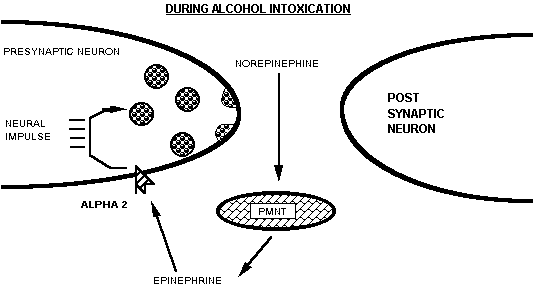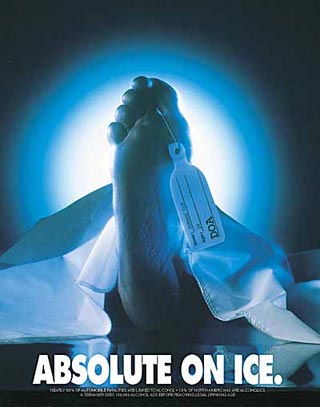
Image credit: Adbusters
Alcoholism is often considered a moral issue; but it has a very real physiological basis that may lead to addiction. There are varying theories as to its cause.
I'm not a biochemist, but my understanding is that when alcohol is consumed, through a complicated process it turns into the opioid neuropeptides known as endorphins and enkephalins. They resemble opiates in their abilities to produce analgesia and a sense of well-being. In other words, they might work as "natural pain killers." The good feeling one gets from an orgasm is partially attributed to the release of endorphins. The common understanding that intense exercise such as the "runner's high" is caused by the release of endorphins is questionable:
"Another widely publicized effect of endorphin production is the so-called "runner's high", which is said to occur when strenuous exercise takes a person over a threshold that activates endorphin production…. However, some scientists question the mechanisms at work, their research possibly demonstrating the high comes from completing a challenge rather than as a result of exertion. (Klosterman) (Altman) There is some recent evidence that endogenous cannabinoids are responsible for "runner's high", rather than endorphins. (Endocannabinoids and exercise, by A Dietrich and W F McDaniel, May 4, 2004 bjsportsmed.com)"

In addition, there is a substance (neurochemical?) produced called Tetrahydroisoquinoline or THIQ, which is normally found in the brains of heroin users.
Tetrahydroisoquinoline compounds (THIQ): Precursor of morphine found in the opium poppy and in mammalian tissues after exposure to ethanol. Development may be dependent on aldehyde concentrations. Enzymes controlling the production of this substance may be genetically determined.
There is genetic evidence that there are ethnic groups with increased risk of developing alcoholism. These include: Irish Catholic (Brad fits this category), American Indians, Scandinavians (I fit this category).
It is theorized that some people are genetically predisposed to alcoholism due to the genetic and biochemical make-up of their brain. Alcoholics tend to love the rush of opiate-related biopeptides that rush through their brain. Some research shows that in alcoholics, a brain function related to hunger-control is triggered, causing the experience of famishment. One drink literally causes the feeling of an insatiable, intense hunger for alcohol.
Unfortunately, for those who are genetically predisposed to alcoholism, there is a progression of the disease. The brain chemistry becomes irrevocably altered, and retains a biochemical memory of sorts. Relapse (use of alcohol) returns the users back to the stage at which they stopped drinking alcohol. The brain biochemistry does not return to normal or heal - the stage of alcoholism continues where the person left off, even decades after their last drink.
The physical dependence to alcohol is caused by the withdrawal of the opioid neuropeptides. The chemical structure of the ethanol-derived opioids mimics the shape of the brain's naturally generated endorphins and enkephalins. Imibing alcohol floods the brain with an excess of these foreign neuropeptides, causing the brain to decrease its natural production of them. The brain to go into neuroadaptation - it stops production of these essential neurotransmitters and the cessation of alcohol use causes the physical symptoms of withdrawal. Withdrawal symptoms from alcohol are exactly like those from the withdrawal of opiates - morphine, codeine and thebaine. In long-term, constant users of alcohol, there is the threat of experiencing delerium tremens which may lead to death.

Photo credit: Adbuster/Alcohol Spoof Ads
From a personal perspective, I definitely have crossed the line from occasional social use, to occasional binges, to regular binges. The binges went from a few times a year to once a week over a period of about 9 years (I didn't drink from age 20 - 32). Now it seems like when I drink, I stay drunk for a few days, not one evening like before. It definitely seems progressive, and that I start where I leave off from my last drinking pattern.
I definitely love the rush of opiate-endorphins I get from alcohol. I can easily drink a mickey of vodka in 20 minutes. Even after feeling the warm, pleasant buzz, I begin to crave more. . .even after 24 ounces. But after the initial few hours of pleasant drunkenness, I tend to pass out, and then the binge experience becomes blurry and generally unpleasant. The last two times I got drunk I ended up experiencing painful withdrawal, in contrast to rarely even getting a noticeable hangover.
I think that alcoholism is far more common than generally acknowledged, especially in gay culture. The abuse of alcohol definitely impacts one's moral character negatively; but more on that another time.
No comments:
Post a Comment